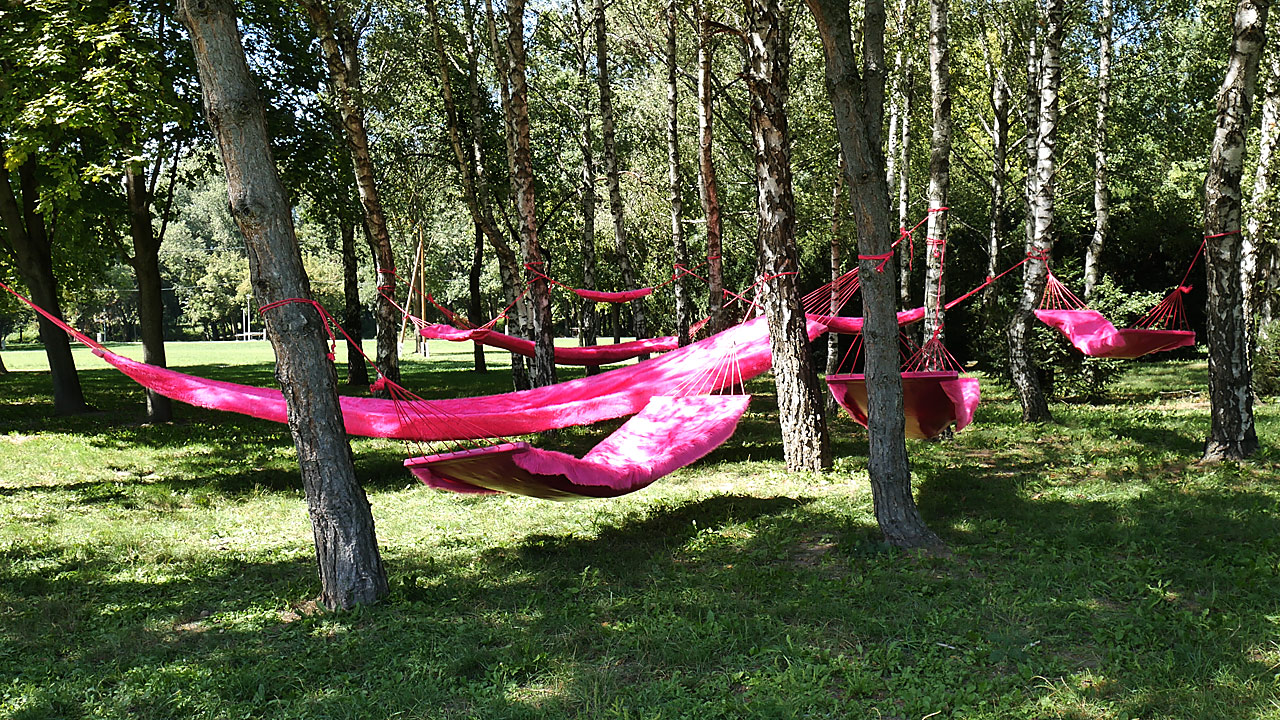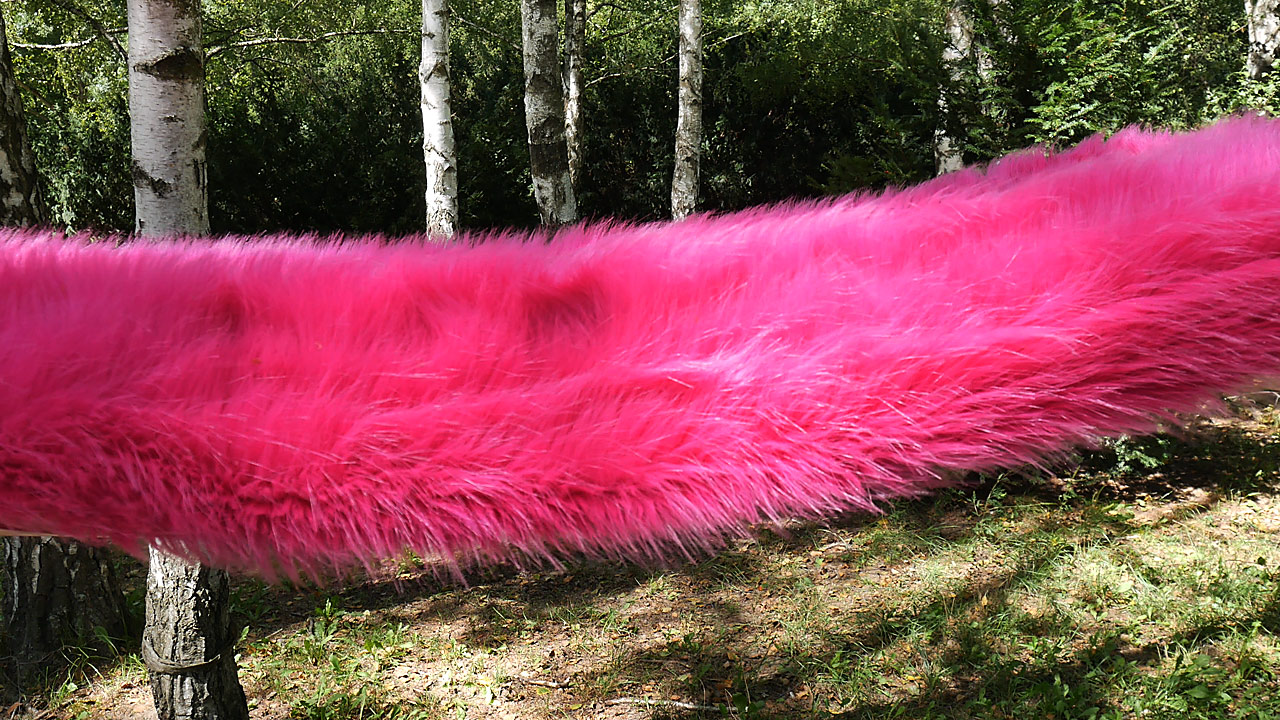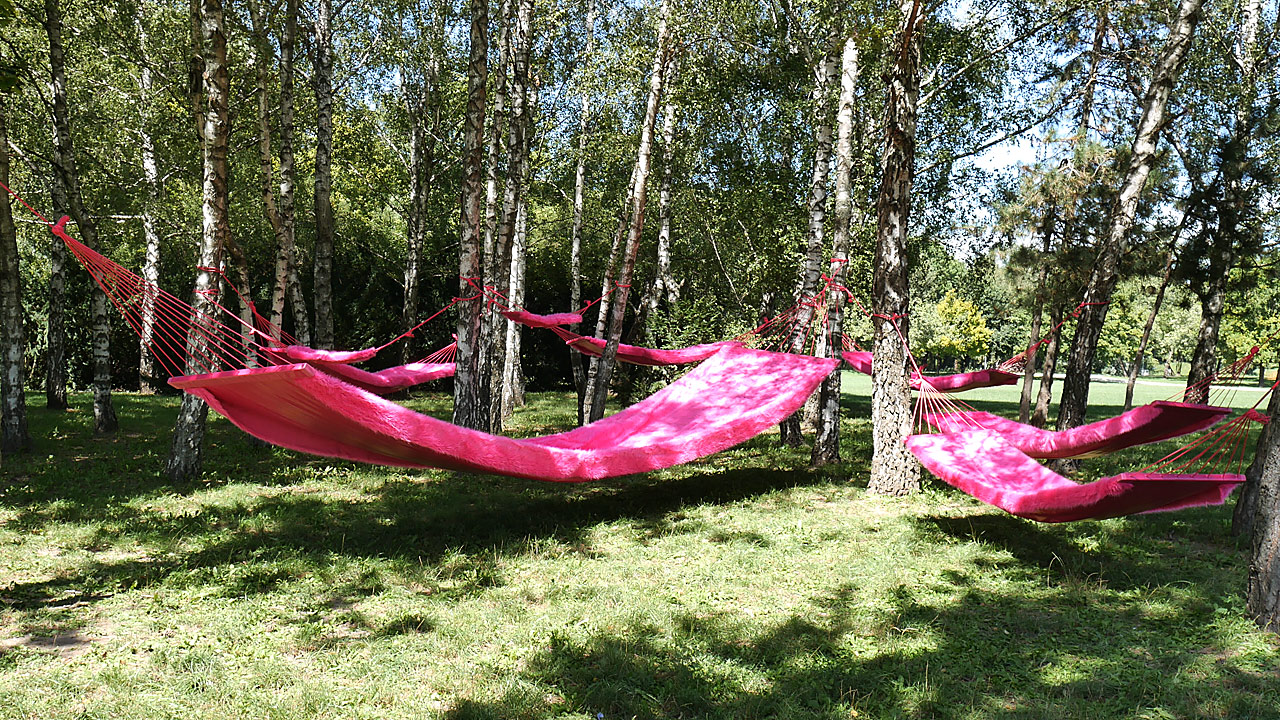Shelter
Genre: intervention (kinetic installation)
Date: 2020
Size: ~ 1200 x 1200 x 250 cm
Materials: artificial fur, fabric, rope
Location: Óbuda Island, Budapest, Hungary
Photo: Joseph Tasnadi
SHELTER
The trial of hope is suffering. Thus, it can happen that we are forced to escape from one refuge and flee to another.
In Maxim Gorky’s play The Lower Depths, the old Luka heartens The Actor saying that he knows a hospital not far away where people get cured of alcoholism. He is lying. There has never been such a miracle hospital. The Actor still believes him. Somehow he fathoms that by recovering, Luka means ceasing to exist. And The Actor ends his life soon after. He manages to escape.
When Luka speaks of hope – as a chance for a great absolute escape – he can only think of disappearing or evanescing. He sees death not as an elementary reason to flee but as the ultimate refuge. His thinking does not assume life as a miracle, but as something inherently temporary. The old man cannot or does not want to take into account that for some mysterious reason life is more attractive to the living than death, moreover, life is the most important thing to most, and the ultimate goal of life is to live it.
Even if it is temporary and full of irreparable contradictions, therefore full of suffering, and therefore – full of escaping.
It seems that within this problematic yet compelling incongruity called life we have far more reasons to escape than there are refuges. There are more causes from where, from what, out of what, and from whom we run away than there are places where, to what, into what, to whom we can run. There appear to be a lot more problems than solutions.
What do all these escapes have in common? Is there a common denominator for escapes? Are we able to coin a concept for ourselves that can capsulize the reason for all escapes, with universal validity? And if we are, will this concept help us withstand anything?
Most people run away because they are scared, often scared of fear itself. Having no better hypothesis than that the purpose of life
is life itself – the cause of this fear might be death, the fear for our lives, the ultimate reason for escape being the hope for a youth without growing old and a life without ever reaching the end of it. It seems plausible that our ultimate refuge is hope. Even if most of the time hope turns out to be unfounded or vain, turning into another source of fear. Even if hope is hypothetical every time and has nothing to do with what we regard as truth. Hope and fear, like refuge and escape, are intertwisted parallels forming an exceptional DNA helix in which the encounter of parallels becomes possible, and where intolerable and tolerable can swap places. In fact, it is not the relationship of hope to truth that matters, but that hope gives us enough pizzazz to flee into life.
Can hope be the common denominator of all our escapes after all?
Over time, we have come to find out things, like, that the Earth is not the center of the Universe. We also found out that the Cosmos
is built up of the combination of only 92 elements, and that life is nothing more than a special case of matter.
However, we have failed to figure out what makes the living so different from the inanimate. Neither do we know how certain combinations of matter became self-aware.
Consciousness is the most stubborn mystery that have ever happened to us – in us.
In lieu of mere hope, can the common denominator of escapes be consciousness whence both fear and hope stem? Is hope often unfounded because consciousness has nothing to do with what is commonly considered completeness?
Nevertheless, consciousness has us believe that fear is unbearably hard and cold, while hope is silky soft, warm, and pampering;
and the order expressed in hope tints it all rose – hope is nothing but reassuring rosiness.
Some assume, confidently, that consciousness along with feelings are just a multitude of simple biochemical algorithms whose sophistication is the result of millions of years of evolution. Others, also confidently, say that it is impossible that consciousness would be the result of algorithms and computing.
While Jenő Henrik Schmitt states: “The contradiction of man is that his consciousness is infinite, but his self-consciousness is finite,
(…) I am the contradiction of infinite consciousness and finite self-consciousness. When I express their battle, I necessarily express myself.”
According to this, the common denominator of all escapes is not (self-)consciousness, but a lifelong struggle in which instances
of hope can only be finite – that is, temporary – victories.
Hope, sooner or later, but eventually proves temporary most of the time. Hope is nothing more than a life-long escape
into the provisional.
Into permanent provisionality.
What is the possible relationship between provisionality and uncertainty? For one, both of them make you flee. These escapes have something to do with the known, or even more, with the unknown. The temporary’s relation to what is known is perceptibly different from that to the uncertain.
We know and, like it or not, we are forced to acknowledge that our lives belong to the temporary.
We also know that we know little. And that our knowledge is wrong. False knowledge is temporary knowledge. It is ignorance, actually. However, we do not feel forced to acknow-ledge ignorance. Ignorance is somehow less fated than the temporality of life. Either way – ignorance is scary. We are scared of it because it harbors no catharsis.
There is an idea proclaiming that the gods were begotten by our ignorance and fears. In their creation, we transferred the capacity of omniscience from the real into the imaginary. We replaced the ephemeral with the constant and ethernal. We turned the physical into metaphysical. We ran from ignorance to faith. By doing so, we created the reality of imagination and the truth of fiction, which finally seemed cathartic enough because we ostensibly eliminated their temporariness. In the gods, we found a metaphor for omniscience. We have worked at length and in depth to transform fiction into reality, often fanatically, with unwavering faith. Meanwhile, we created fantastic stories and told them to each other. We fled into the “divine” stories of the gods. It felt good to listen to them, and it seemed like a good strategy to follow them.
Then it turned out that this elimination of the temporary was temporary, too. Our hope for the eternal truth of the gods was dashed along the way. We started to feel more and more often that the gods had let us down. We gradually escaped from this “darkness” into the “light.” We replaced faith with doubt, irrationality with reason, and mythology with history. We started to hope for knowledge. And as it seems slightly more sober and sensible, we take our new hope for knowledge as progress, arguably because in this hope we restored temporality, change, and entropy as constants.
In the meantime, we keep inventing and telling exciting stories. Now we are escaping into stories about knowledge and reason.
It feels good to listen to them, and it seems like a good strategy to follow them.
All in all, it became obvious that we are not able to evade temporality.
The temporary is our constant.
It also seems obvious that what can be said to be constant within the provisionality of life – i.e., our attraction to stories – is, in essence, independent of its positive or negative, personally or collectively applicable morality. So one way or another, stories are important to us even if they are not true. We love to escape into each other’s stories.
The Lower Depths is a refuge made of escape stories with one common denominator – the shocking lack of catharsis. It is a story that we the others can temporarily flee into.
And this way, we can avoid being in our own story for a while.
**********
MENHELY
A remény tesztje a szenvedés. Így előfordul, hogy egyik menedékhelyről egy másik menedékhelyre vagyunk kénytelenek menekülni.
Maxim Gorkij Éjjeli menedékhely című darabjában – az öreg Luka azzal lelkesíti a Színészt, hogy nem is olyan messze van egy kórház, ahol az embert ki tudják gyógyítani az alkoholizmusból. Hazudik. Sosem volt ilyen csodakórház. A Színész mégis hisz neki. Valahogy megsejti, hogy gyógyulás alatt Luka a megsemmisülést érti. A Színész nemsokára öngyilkos lesz. Megmenekül.
Miközben Luka a reményről beszél – a nagy, az abszolút menekülés lehetőségeként – csak az eltűnésre, a megszűnésre tud gondolni. A halált nem a menekülés elementáris okának tekinti, hanem végső menedéknek. Nem az élet csodáján belül gondolkodik, hanem annak szükségszerű ideiglenességén. Az öreg nem tudja vagy nem akarja figyelembe venni, hogy valamilyen rejtélyes oknál fogva – az élet vonzóbb a halálnál, hogy a legtöbb élőnek – az élet a legfontosabb, hogy az élet végső célja – maga az élet. Még akkor is, ha ideiglenes és tele van feldolgozhatatlan ellentmondással, így szenvedéssel is. Következésképp pedig meneküléssel.
Úgy tűnik, hogy ezen az életnek nevezett – problémás és mégis igéző ellentmondásosságon belül valóban messze több ok van
a menekülésre, mint ahány menedékhely. Több a honnan, mitől, miből, kitől – mint a hova, mihez, mibe, kihez. Úgy tűnik, hogy sokkal több a probléma, mint a megoldás.
Mi az, ami minden menekülésben közös? Létezik-e a menekülések közös nevezője? Vajon képesek vagyunk alkotni magunknak egy olyan fogalmat, amely általános érvénnyel összefoglalja minden menekülés okát? És ha igen, segíthet-e egy fogalom elviselni bármit is?
Legtöbbünk félelemből menekül. Gyakran magától a félelemtől is félve. Nem lévén jobb hipotézis, mint hogy az élet célja maga az élet, elképzelhető, hogy a félelem oka egyszerűen a halál. Az élet féltése. A menekülés végső oka pedig: az öregség nélküli fiatalság és a halál nélküli élet reménye. Hihetőnek tűnhet, hogy a remény maga az abszolút menedékhely. Még akkor is, ha legtöbbször a remény alaptalannak vagy tévesnek bizonyul, és egy másik félelem forrásává válhat. Még akkor is, ha a remény minden esetben hipotetikus, és nincs köze ahhoz, amit igazságnak gondolunk. A remény és a félelem, akárcsak a menedékhely és a menekülés, megcsavart párhuzamosok. Olyanok, mint valami kivételes DNS-hélix, amelyben a párhuzamosok találkozása lehetségessé válik. Ahol az elviselhetetlen és az elviselhető helyet cserélhet. Tulajdonképpen nem is a remény igazsághoz való viszonya a lényeges, hanem az, hogy energiát ad az életbe való meneküléshez.
Lehet, hogy a menekülések közös nevezője mégiscsak a remény?
Az idők során sikerült kiderítenünk például azt, hogy a Föld nem az Univerzum közép-pontja. Az is kiderült, hogy a mindenség csupán 92 elem kombinációiból születik, és hogy az élet maga – nem több mint az anyag sajátos előfordulása. Arra viszont nem sikerült rájönnünk, hogy mi teszi az élőt annyira különbözővé az élettelentől. Mint ahogy arra sem, hogy az anyag bizonyos kombinációi miként tettek szert öntudatra.
Az öntudat a legmakacsabb rejtély, ami velünk és bennünk történik.
Lehet, hogy a menekülések közös nevezője mégsem a puszta remény, hanem a félelmet és a reményt egyaránt generáló öntudat?
Lehet, hogy a remény gyakran azért alaptalan, mert az öntudatnak nincs köze ahhoz, amit teljességnek gondolunk?
Az öntudat mégis elhiteti velünk, hogy a félelem elviselhetetlenül kemény és hideg. Mint ahogy azt is, hogy a remény selymesen puha, meleg és kényeztető, és hogy a reményben megfogalmazódó rend festi azt rózsaszínűre. Hogy a remény maga a megnyugtató rózsaszínség.
Vannak, akik az öntudatot és az érzéseket – magabiztosan – egyszerű biokémiai algoritmusok sokaságának tételezik, melyek kifinomultsága a több millió éves evolúció eredménye. Mások – ugyancsak magabiztosan – azt mondják, hogy az öntudat nem lehet algoritmusok és számolás eredménye.
Schmitt Jenő Henrik pedig ezt mondja: „Az ember ellentmondása az, hogy végtelen a tudata, de véges az öntudata, (…)
végtelen tudat és véges öntudat ellentmondása vagyok. Ha ki akarom fejezni harcukat, szükségképp magamat fejezem ki.”
Eszerint a menekülések közös nevezője mégsem az öntudat, hanem egy életen át tartó küzdelem, amelyben a remények csak véges – azaz ideiglenes győzelmek lehetnek. A remény előbb vagy utóbb, de legtöbbször ideiglenesnek bizonyul. A reménykedés nem más, mint életfogytiglan tartó menekülés az ideiglenesbe.
Az állandó ideiglenességbe.
Milyen összefüggés lehetséges az ideiglenesség és a bizonytalanság között? Például az, hogy mindkettő menekülésre késztet. Ezeknek a meneküléseknek az értetthez vagy éppen a nem értetthez van köze. Az ideiglenes érzékelhetően másképp viszonyul az értetthez, mint a bizonytalanság.
Tudjuk, hogy ideiglenesen vagyunk életben. És ezt – tetszik vagy nem – kénytelenek vagyunk tudomásul venni.
Azt is tudjuk, hogy keveset tudunk. És azt is, hogy tudásunk téves. A téves tudás – ideig-lenes tudás. Tulajdonképpen tudatlanság. Mindazonáltal a tudatlanságot nem vagyunk kénytelenek tudomásul venni. A tudatlanság valahogy kevésbé sorsszerű, mint az élet ideiglenessége. Akárhogy is – a tudatlanság ijesztő. Félünk tőle, mert nincs benne katarzis.
Van olyan vélekedés, miszerint: tudatlanságunk és félelmeink alkották az isteneket. Az istenek megalkotása közben a mindentudás képességét a valósból a képzeletbelibe helyeztük át. A mulandót kicseréltük az állandóra és az örökkévalóra. A fizikait metafizikaivá lényegítettük át. A tudatlanságból a hitbe menekültünk. Ezzel megalkottuk magunknak a képzelet, a fikció realitását és igazságát, ami azért tűnt katartikusnak, mert látszólag kiiktattuk belőle az ideiglenességet. Az istenekben találtuk meg a mindentudás metaforáját. Hosszasan és elmélyülten dolgoztunk a fikció realitássá alakításán. Rendíthetetlen hittel és gyakran fanatikusan. Eközben fantasztikus történeteket alkottunk és meséltünk egymásnak. Az istenek „isteni” történeteibe menekültünk. Jó volt őket hallgatni, és jó stratégiának tűnt követni őket.
Aztán kiderült, hogy az ideiglenesség kiiktatása is ideiglenes volt. Menet közben szertefoszlottak az istenek örökkévaló igazságát illető reményeink. Egyre gyakrabban éreztük, hogy az istenek cserbenhagytak minket. A „sötétségből” fokozatosan kimenekültünk
a „világosságba”. A hitet kételyre, az irracionálisat racionálisra, a mítoszt történelemre cseréltük. Elkezdtünk a tudásban reménykedni. Haladásnak értékeljük, hogy a tudásban való reménykedésünk valamivel józanabbnak és racionálisabbnak tűnik. Talán mert ebbe a reménykedésbe visszaiktattuk az ideiglenességet, a változást és az entrópiát mint állandókat.
Eközben izgalmas történeteket alkotunk és mesélünk egymásnak. Most a tudás és a racionalitás történeteibe menekülünk.
Jó őket hallgatni, és jó stratégiának tűnik követni őket.
Mindent összevetve, nyilvánvaló, hogy képtelenek vagyunk megkerülni az ideiglenességet.
Esetünkben az ideiglenesség az állandó.
Az is nyilvánvalónak tűnik, hogy ami az élet ideiglenességén belül mégiscsak állandónak mondható, az a történetekhez való vonzódásunk – lényegében függetlenül azok morális, pozitív vagy negatív, személyes vagy kollektív érvényű tartalmától.
Így vagy úgy – a történetek akkor is fontosak nekünk, ha nem igazak. Szeretünk egymás történeteibe menekülni.
Az Éjjeli menedékhely olyan meneküléstörténetek menedéke, melyeknek közös nevezője a megrendítő katarzishiány.
Az Éjjeli menedékhely olyan történet, amelybe – mi, többiek – ideiglenesen belemenekülhetünk.
Addig sem kell a saját történetünkben tartózkodnunk.









